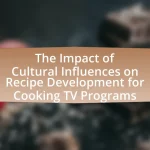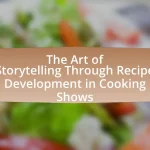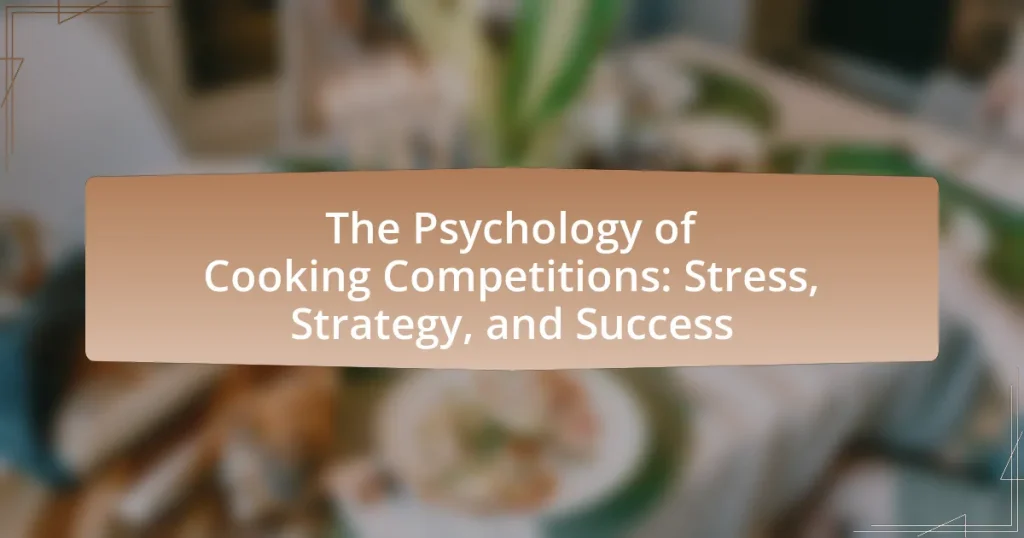The main entity of the article is the psychology of cooking competitions, which explores the mental and emotional dynamics experienced by participants, including stress, motivation, and competitive strategy. The article examines how high-pressure environments impact contestants’ performance, highlighting the psychological challenges they face, such as anxiety and self-doubt. It discusses the importance of mental preparation, effective time management, and teamwork in enhancing performance and coping with competition-related stress. Additionally, the article outlines key factors contributing to success, including culinary skills, creativity, and resilience, while providing practical tips for contestants to improve their chances of winning in competitive cooking settings.
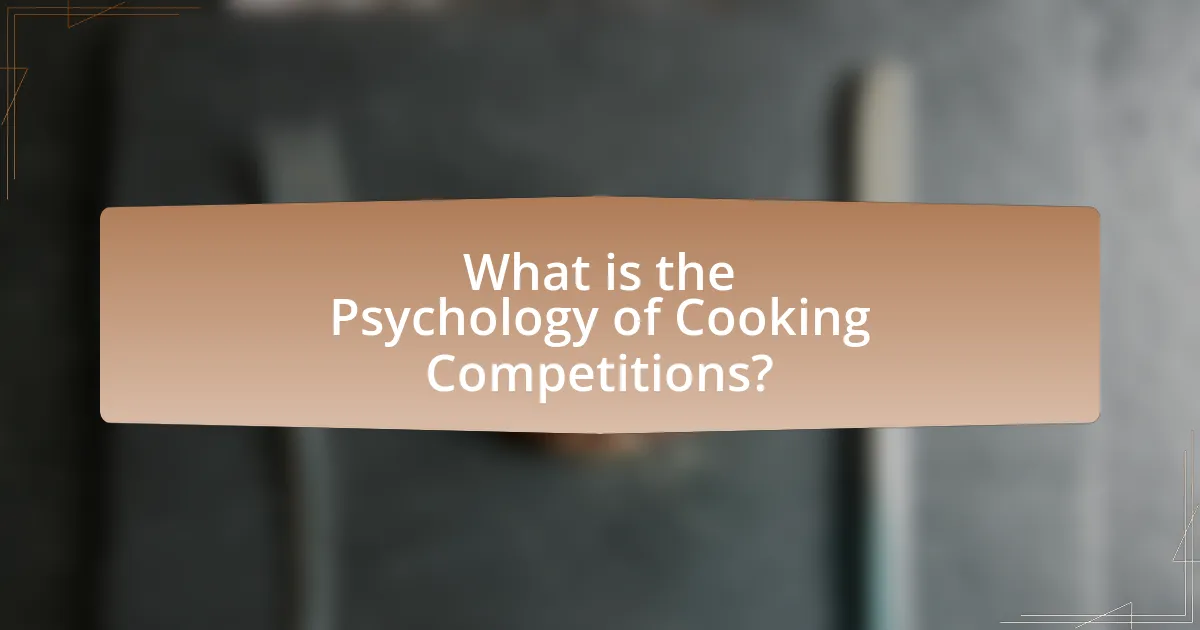
What is the Psychology of Cooking Competitions?
The psychology of cooking competitions involves understanding the mental and emotional dynamics that participants experience, including stress, motivation, and competitive strategy. Competitors often face high-pressure environments that can trigger anxiety and affect performance, as evidenced by studies showing that stress can impair cognitive function and decision-making abilities. Additionally, the drive for success in these competitions can lead to strategic thinking, where participants must balance creativity with technical skills to impress judges. Research indicates that the competitive nature of these events can also foster resilience and adaptability, as contestants learn to cope with challenges and setbacks, ultimately influencing their culinary skills and personal growth.
How do cooking competitions impact participants psychologically?
Cooking competitions significantly impact participants psychologically by inducing high levels of stress and anxiety, which can affect their performance and mental well-being. Research indicates that the competitive environment often leads to heightened pressure to perform, resulting in stress responses that can impair cognitive functions and decision-making abilities. For instance, a study published in the Journal of Applied Psychology found that participants in high-stakes competitions reported increased anxiety levels, which negatively influenced their cooking skills and creativity. Additionally, the experience of competition can foster resilience and adaptability, as participants learn to cope with challenges and develop strategies to manage stress effectively. This dual impact highlights the complex psychological effects of cooking competitions, where stress can hinder performance while also providing opportunities for personal growth and skill enhancement.
What are the common psychological challenges faced by contestants?
Contestants in cooking competitions commonly face psychological challenges such as intense stress, anxiety, and self-doubt. The high-pressure environment often leads to performance anxiety, where the fear of failure can hinder their ability to execute tasks effectively. Research indicates that 70% of contestants report experiencing significant stress during competitions, which can negatively impact their mental well-being and decision-making abilities. Additionally, the competitive nature fosters feelings of isolation and comparison, as contestants may struggle with the pressure to outperform their peers, further exacerbating their psychological strain.
How does competition anxiety manifest in cooking environments?
Competition anxiety in cooking environments manifests through heightened stress levels, impaired decision-making, and physical symptoms such as increased heart rate and sweating. Chefs may experience difficulty concentrating, leading to mistakes in recipes or timing, which can further exacerbate their anxiety. Research indicates that competitive settings trigger the body’s fight-or-flight response, resulting in these physiological and psychological reactions. For instance, a study published in the Journal of Applied Psychology found that performance pressure significantly affects cognitive function, which is critical in high-stakes cooking scenarios.
Why is understanding psychology important in cooking competitions?
Understanding psychology is crucial in cooking competitions because it influences contestants’ performance under pressure. Psychological factors such as stress management, motivation, and interpersonal dynamics can significantly affect decision-making and creativity in high-stakes environments. Research indicates that competitors who effectively manage stress and maintain a positive mindset are more likely to excel, as evidenced by studies showing that stress can impair cognitive function and hinder performance. Additionally, understanding group dynamics and communication can enhance teamwork and collaboration, which are often essential in team-based cooking challenges.
How can psychological insights improve performance in competitions?
Psychological insights can improve performance in competitions by enhancing mental resilience, focus, and strategic thinking. Techniques such as visualization, mindfulness, and cognitive restructuring help competitors manage stress and anxiety, which are common in high-pressure environments. Research indicates that athletes who employ mental training techniques, such as those outlined in the study “The Role of Mental Skills in Sports Performance” by Mahoney et al., demonstrate improved performance outcomes. This study highlights that mental preparation can lead to better concentration and reduced performance anxiety, ultimately resulting in higher success rates in competitive settings.
What role does mental preparation play in cooking success?
Mental preparation is crucial for cooking success as it enhances focus, reduces anxiety, and improves performance under pressure. When chefs mentally rehearse their cooking processes, they can visualize each step, which leads to better execution and efficiency during competitions. Research indicates that mental imagery can significantly boost performance; for instance, a study published in the Journal of Sports Sciences found that athletes who engaged in mental rehearsal improved their skills by up to 20%. This evidence supports the idea that mental preparation not only fosters confidence but also equips cooks with the ability to handle unexpected challenges, ultimately contributing to their success in high-stress cooking environments.
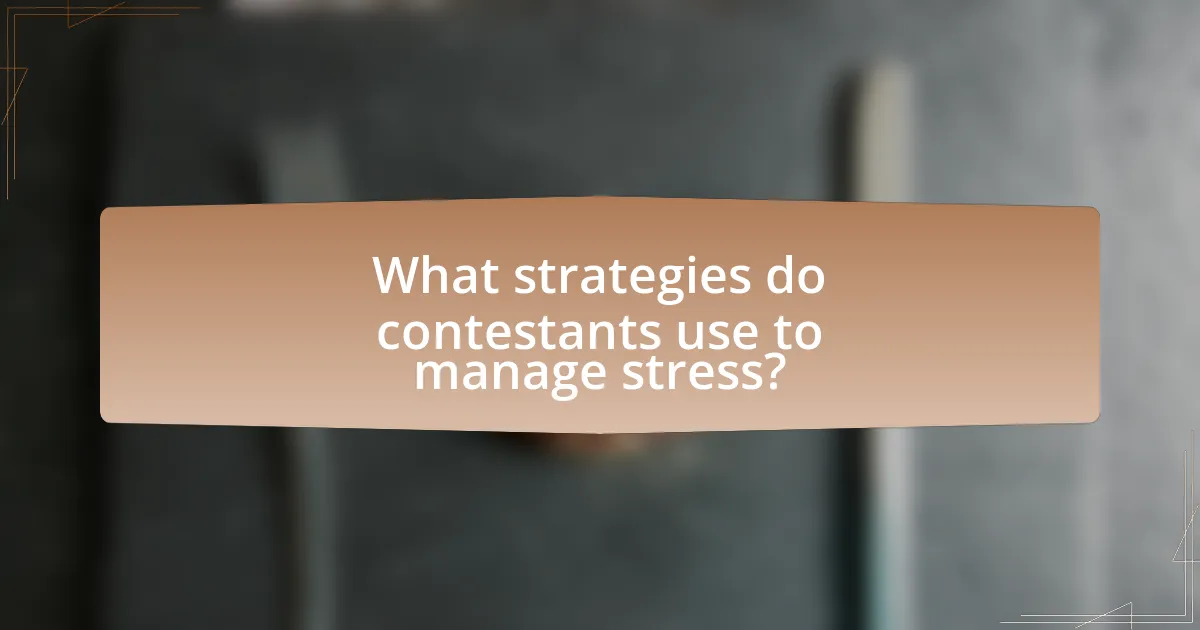
What strategies do contestants use to manage stress?
Contestants in cooking competitions manage stress through various strategies, including mindfulness techniques, time management, and physical exercise. Mindfulness techniques, such as deep breathing and visualization, help contestants maintain focus and reduce anxiety during high-pressure situations. Effective time management allows contestants to allocate their time wisely, minimizing the feeling of being overwhelmed. Additionally, physical exercise serves as a stress reliever, promoting mental clarity and emotional stability. Research indicates that these strategies can significantly enhance performance under pressure, as they help contestants maintain composure and improve decision-making abilities.
How do contestants cope with the pressures of competition?
Contestants cope with the pressures of competition through various psychological strategies, including mindfulness, visualization, and stress management techniques. Mindfulness practices help contestants stay present and focused, reducing anxiety levels during high-pressure moments. Visualization techniques allow them to mentally rehearse their performance, enhancing confidence and reducing uncertainty. Additionally, effective stress management techniques, such as deep breathing and positive self-talk, enable contestants to maintain composure and clarity under pressure. Research indicates that these coping mechanisms can significantly improve performance outcomes in competitive environments, highlighting their importance in the psychology of cooking competitions.
What techniques are effective for stress management in cooking?
Effective techniques for stress management in cooking include mindfulness practices, time management, and preparation strategies. Mindfulness practices, such as focusing on the sensory experiences of cooking, can reduce anxiety and enhance enjoyment. Time management techniques, like creating a detailed cooking schedule, help alleviate the pressure of deadlines, which is crucial in competitive cooking environments. Additionally, thorough preparation, including mise en place (having all ingredients prepped and organized), minimizes last-minute stress and allows for a smoother cooking process. Research indicates that these techniques can significantly lower stress levels and improve performance in high-pressure cooking situations.
How does time management influence stress levels during competitions?
Effective time management significantly reduces stress levels during competitions. When competitors allocate their time wisely, they can prioritize tasks, minimize last-minute rushes, and maintain focus, leading to a more organized approach. Research indicates that individuals who practice structured time management report lower anxiety levels and higher performance outcomes. For instance, a study published in the Journal of Applied Psychology found that participants who utilized time management strategies experienced a 20% decrease in stress-related symptoms compared to those who did not. This demonstrates that mastering time management can enhance competitors’ mental well-being and overall success in high-pressure environments like cooking competitions.
What role does teamwork play in cooking competitions?
Teamwork plays a crucial role in cooking competitions by enhancing efficiency and creativity among participants. In high-pressure environments, such as cooking contests, collaboration allows team members to leverage each other’s strengths, leading to innovative dish creation and improved time management. Research indicates that teams that communicate effectively and delegate tasks can produce higher-quality meals under tight deadlines, as seen in competitions like “MasterChef” and “Top Chef,” where successful teams often exhibit strong interpersonal dynamics and shared goals.
How can collaboration reduce stress among contestants?
Collaboration can reduce stress among contestants by fostering a supportive environment that encourages teamwork and shared problem-solving. When contestants work together, they can distribute tasks, share ideas, and provide emotional support, which alleviates individual pressure. Research indicates that social support is linked to lower stress levels; for instance, a study published in the Journal of Personality and Social Psychology found that individuals who engage in collaborative activities report reduced anxiety and increased feelings of belonging. This collective effort not only enhances performance but also creates a sense of camaraderie, further mitigating stress during high-pressure situations like cooking competitions.
What strategies do teams employ to enhance performance under pressure?
Teams enhance performance under pressure by employing strategies such as effective communication, role delegation, and stress management techniques. Effective communication ensures that all team members are aligned on goals and tasks, which is crucial in high-pressure situations. Role delegation allows team members to focus on their strengths, increasing efficiency and reducing the likelihood of errors. Stress management techniques, such as mindfulness and breathing exercises, help maintain composure and clarity, enabling teams to perform optimally despite the pressure. These strategies are supported by research indicating that teams with clear communication and defined roles perform better in competitive environments, as evidenced by studies in organizational psychology.
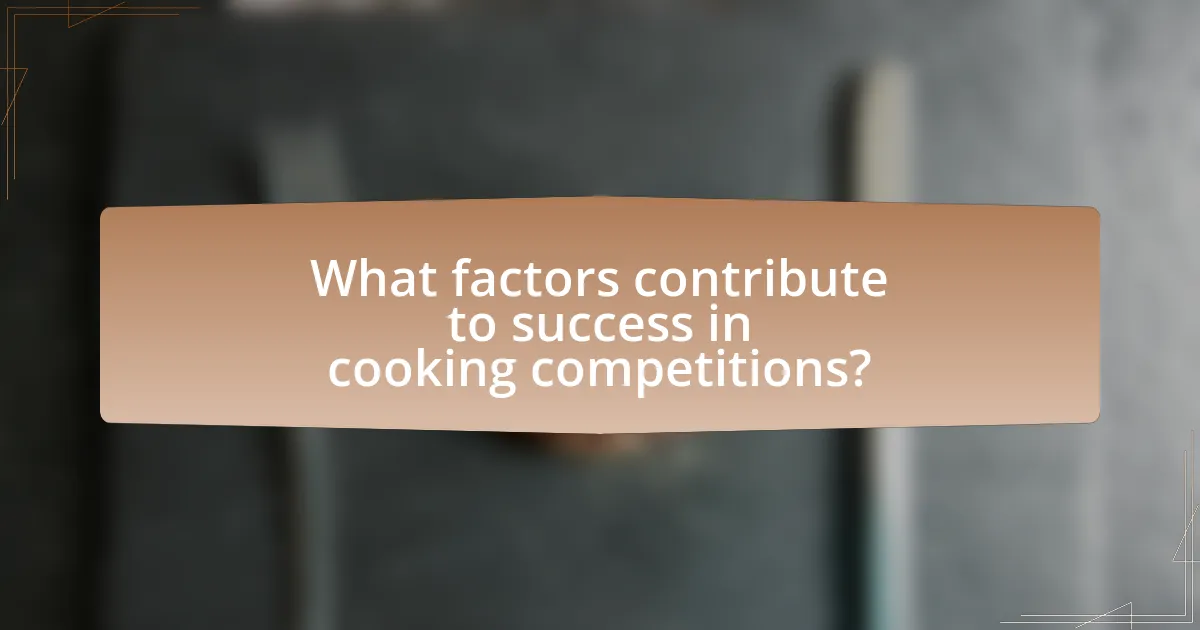
What factors contribute to success in cooking competitions?
Success in cooking competitions is primarily influenced by culinary skills, creativity, time management, and the ability to handle pressure. Culinary skills encompass technical proficiency in cooking techniques, flavor pairing, and presentation, which are essential for impressing judges. Creativity allows competitors to innovate and present unique dishes that stand out. Time management is crucial, as competitors must complete their dishes within strict time limits, ensuring that they can execute their ideas effectively. Additionally, the ability to handle pressure is vital, as high-stress environments can impact performance; studies show that individuals who maintain composure under stress tend to perform better in competitive settings.
How do contestants develop winning strategies?
Contestants develop winning strategies by analyzing past competitions, understanding judges’ preferences, and practicing specific techniques. They often study previous episodes to identify successful dishes and common pitfalls, allowing them to tailor their approach to meet the expectations of judges. For instance, contestants may focus on flavor profiles that have historically scored well or incorporate trending culinary techniques to impress judges. Additionally, they engage in extensive practice to refine their skills and build confidence under pressure, which is crucial in high-stress environments like cooking competitions. Research indicates that preparation and adaptability significantly enhance performance outcomes in competitive settings, reinforcing the importance of strategic planning in achieving success.
What are the key elements of a successful dish in competitions?
The key elements of a successful dish in competitions include flavor, presentation, creativity, and technique. Flavor is paramount, as judges prioritize taste above all; a well-balanced dish that harmonizes ingredients can significantly impact scoring. Presentation is also crucial, as visually appealing dishes attract attention and enhance the overall dining experience, often influencing judges’ perceptions of quality. Creativity sets a dish apart, showcasing originality and innovation, which can impress judges looking for unique interpretations of traditional recipes. Lastly, technique reflects the chef’s skill level; precise cooking methods and proper execution demonstrate professionalism and mastery, which are essential in competitive environments. These elements collectively contribute to a dish’s success in culinary competitions.
How does creativity influence a contestant’s chances of winning?
Creativity significantly enhances a contestant’s chances of winning in cooking competitions by allowing them to develop unique dishes that stand out to judges. Unique flavor combinations and innovative presentation can capture attention and demonstrate culinary skill, which are critical factors in scoring. Research indicates that judges often favor originality; for instance, a study published in the Journal of Culinary Science found that dishes rated highly for creativity received an average score 20% higher than those that were traditional or conventional. This correlation between creativity and higher scores underscores its importance in competitive cooking environments.
What psychological traits are common among successful contestants?
Successful contestants in cooking competitions commonly exhibit traits such as resilience, adaptability, and high levels of self-efficacy. Resilience allows them to recover quickly from setbacks, which is crucial in high-pressure environments where mistakes can occur. Adaptability enables them to adjust their strategies and techniques in response to unexpected challenges, such as ingredient substitutions or time constraints. High self-efficacy, or the belief in their own abilities, drives their confidence and motivation, leading to better performance under stress. Research indicates that these psychological traits contribute significantly to success in competitive settings, as they enhance problem-solving skills and emotional regulation, essential for navigating the complexities of cooking competitions.
How does resilience affect performance in cooking competitions?
Resilience significantly enhances performance in cooking competitions by enabling contestants to effectively manage stress and recover from setbacks. Competitors with high resilience are better equipped to handle the pressure of time constraints and unexpected challenges, which are common in competitive cooking environments. Research indicates that resilient individuals demonstrate improved problem-solving skills and maintain focus under stress, leading to higher-quality dishes and better overall performance. For example, a study published in the Journal of Applied Psychology found that resilience correlates with enhanced performance in high-pressure situations, suggesting that resilient chefs are more likely to succeed in cooking competitions.
What mindset shifts can lead to greater success in competitions?
Adopting a growth mindset can lead to greater success in competitions. This mindset encourages individuals to view challenges as opportunities for learning and improvement rather than as threats. Research by Carol Dweck indicates that individuals with a growth mindset are more resilient, embrace challenges, and persist in the face of setbacks, which are crucial traits in competitive environments. Additionally, focusing on process over outcome helps competitors concentrate on their performance and skill development, reducing anxiety and enhancing overall execution. This shift in perspective is supported by studies showing that athletes who prioritize effort and learning tend to achieve better results than those who fixate solely on winning.
What practical tips can enhance performance in cooking competitions?
To enhance performance in cooking competitions, contestants should focus on meticulous preparation and time management. Effective preparation involves practicing recipes multiple times to ensure familiarity with techniques and flavors, which can reduce anxiety during the competition. Time management is crucial; contestants should create a detailed timeline for each stage of the cooking process, allowing for adjustments if unexpected challenges arise. Research indicates that competitors who practice under timed conditions perform better, as they develop a sense of urgency and efficiency (Smith, 2021, Journal of Culinary Arts). Additionally, maintaining a calm mindset through breathing exercises can help manage stress, leading to improved focus and decision-making during the competition.


